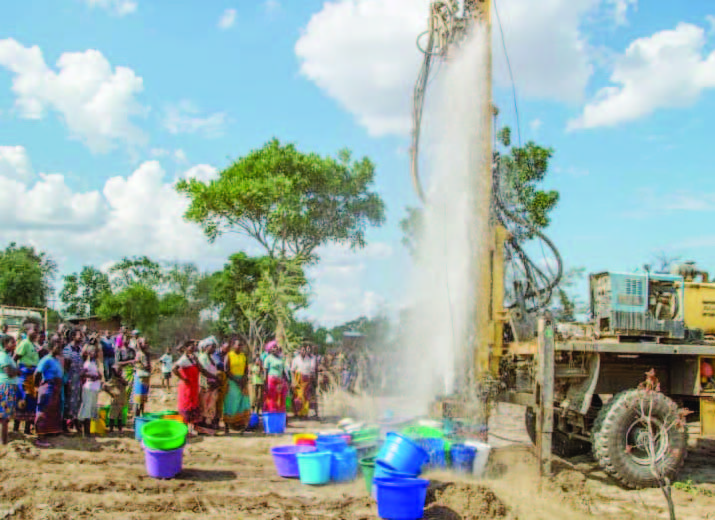The precious water drop
While other children were waking up to play and prepare for school, for nine-year-old Ireen Samuel, sunrise meant time to go fetch water.
Living in Mgololo Kunsi Village in Nkhoma, Lilongwe District, the little girl had to walk two kilometres to draw water from a contaminated stream. It was the only source of water in the area.

Often, one member of her family was on the sick bed nursing some sickness induced by drinking contaminated water.
Diarrhoeal and other water-borne diseases were the talk of the day. This severely undermined the family’s capacity to develop.
Sometimes, Ireen missed school because she had to go to the stream three times a day as she was the only one who fetched water in the family.
She was a victim of culture in a society where a girl child has to do all the household chores while the boy child prepares for school.
Ireen explains: “Life was tough. Everyone looked to me when there was no water in the house. We never even cared if the water was safe and clean to drink or not. What mattered was having the water available.”
But as the old adage goes, “every tough situation has an ending”.
Ireen was later identified by World Vision Malawi (WVM) when looking for a child aged seven to 10 whose life was at stake because of poor access to potable water.
As a child raised in an economically-deprived background and being raised by a single mother of four, Ireen qualified to become a WVM ambassador of children who have gone through extraordinary circumstances to access water.
However, it took a while before resources were put together for Ireen and her community to easily access clean and safe water.
Later, a global effort was made to ensure that the nine-year-old girl has a more secure future by providing her and her family potable water.
A borehole, courtesy of WVM, was later drilled just 100 metres from Ireen’s home. The sight of the first drop from the borehole was mesmerising and the community was all smiles.
Ireen’s mother, Happiness Samuel, explains that she regularly experienced open bowels because of the contaminated water from the stream.
She said: “Recently, I developed an eye infection and had to go to the hospital for treatment. It was difficult for the medical personnel to diagnose me as he never knew what really caused the infection. But I am certain it was due to the unsafe water that we used to drink.”
Hence, Happiness was overjoyed with the coming in of the borehole. It meant her daughter would now concentrate on school and would live a healthier and more robust life.
The 2015-2016 Malawi Demographic Health Survey reported that 87 percent of households use improved sources of drinking water, and that 85 percent of rural households use water from an improved source compared with 98 percent of urban households.
The survey indicates that rural households rely on tube wells or boreholes for safe water, followed by 15 percent of unimproved sources. It also shows that only two percent of rural households have piped water.
The sad part is that about 47 percent of households travel 30 minutes or longer to fetch drinking water.
To avoid water-borne diseases, the survey reports that 26 percent of households in Malawi are using an appropriate treatment method, with 20 percent in urban and 27 percent in rural areas.
Group village head Mgololo Kunsi could not hide his joy when he saw the borehole drilling team at work. He said this was the beginning of a new era for his people.
The local leader said the rainy season was quite hectic as water from the stream was more contaminated, and he lost a number of people to various water-borne diseases.
“There will finally be peace because we will have potable water, and the incidences of water-borne diseases will drop,” he said.
Kunsi said he will encourage his subjects to initiate backyard gardens to produce vegetables in their homes.
According to WVM Wash development facilitator Irene Chongwe Banda, providing communities with safe and clean water has helped a lot of children to grow healthy, and also reduced their burden of travelling long distances to fetch water.
She said: “A lot of things happen to our young ones when they have to travel long distances for clean water.
“As such, they end up using unsafe water from untreated wells, which poses a threat to their well-being.
“As WVM, we aim to safeguard the lives and future of children who are considered vulnerable by providing them with clean water to protect them from water-borne diseases, among other services.
WVM is directly supporting an estimated 1.5 million children across the country’s 28 districts in health and nutrition, food security, education, humanitarian response, advocacy, and water, sanitation and hygiene (Wash).
Since 2012, WVM has drilled 46 boreholes in the Nkhoma programme area, including this borehole for Ireen and her community.





